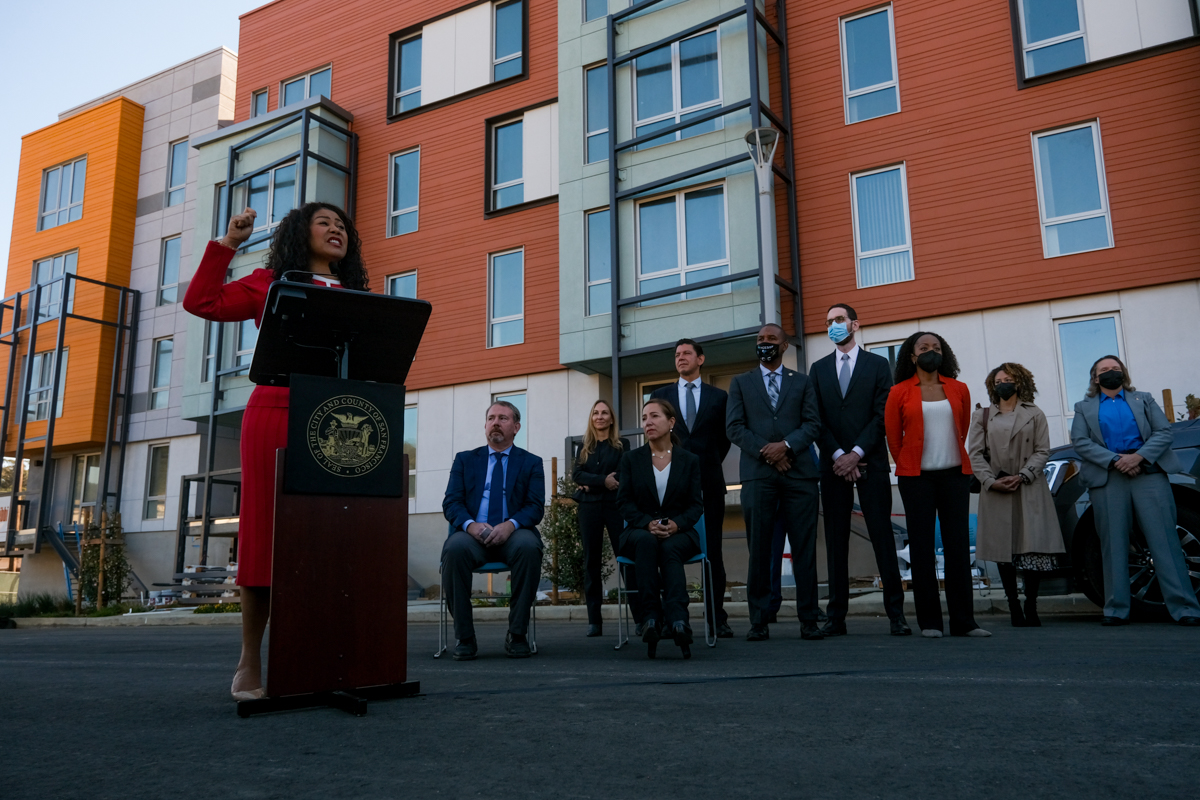As congressional Democrats hammer out the details of a sweeping economic proposal, federal, state and local leaders converged upon a Sunnydale housing development to tout what they described as a national model for affordable housing and an example of what could be accomplished with a fresh infusion of federal dollars.
On Friday, Mayor London Breed and House Speaker Nancy Pelosi joined Marcia Fudge, Secretary of the U.S. Department of Housing and Urban Development, for a tour of newly built apartments in San Francisco’s Sunnydale neighborhood, which are part of the ongoing redevelopment of the neglected southeastern district. The group pointed to the emerging, mixed-use neighborhood as one solution to a protracted housing crisis statewide.
“This is transformative,” said Breed, showcasing a unit’s spacious kitchen and living area at 242 Hahn Street, a 167-unit complex nearing completion in Sunnydale.
“The conditions here were like the projects my mother grew up in,” Breed added, referring to the old and dilapidated Sunnydale housing projects—originally built as temporary housing in the 1940s—that the new apartments are meant to replace.


Dubbed Sunnydale Hope SF, the sprawling development will consist of 1,770 residential units spread across several apartment buildings, new streets and infrastructure, green space, and retail once complete. Of about 1000 affordable units planned, 775 are earmarked as replacement units for existing residents of Sunnydale’s housing projects, whose homes may be demolished as part of the phased redevelopment of the area.
Breed acknowledged local skepticism around the development, which is led by Mercy Housing, an affordable housing developer that operates hundreds of units in San Francisco, and the city’s Housing Authority. Hope SF is a public-private development initiative that seeks to transform distressed public housing sites in San Francisco and includes three other sites in the city’s southeastern half in addition to Sunnydale.
Indeed, a small group of protesters convened outside a scheduled press conference with Breed, Pelosi and Fudge, voicing worries that the new Sunnydale—a mixed-use, mixed-income development—will mean higher rents and displacement of existing residents. According to San Francisco’s housing portal, rents at Mercy Housing’s affordable units in Sunnydale range from $1,289 to $2,075 for a two-bedroom apartment depending on household income.
“Four or five generations have been born here; they don’t want to get away from where they grew up,” said Tina Kese, a mother of four in Sunnydale. “We want to kick Mercy out.”
Pointing to her own experience growing up in public housing, and seeing neighbors displaced to other parts of the Bay Area when housing was demolished, Breed emphasized that each current Sunnydale tenant is entitled to a new unit on a one-to-one basis: “This community has been neglected,” said Breed. “And this has been a really challenging project with a lot of promises made.”
Pelosi, who is currently mired in negotiations for the Build Back Better Act and another bipartisan infrastructure bill, said that California affordable housing developers have “figured out a way to make use of every public policy option”—low-income housing tax credits, bonds, or other appropriations—to chip away at the state’s shortage of affordable housing.
The Build Back Better Act, a $3.5 trillion, 10-year bill that aims to expand the social safety net and environmental initiatives, includes more than $300 billion for new and existing affordable and public housing. Provisions in the most recent version of the bill include $80 billion in capital investments for public housing, $80 billion for additional retrofits and construction of affordable housing, $90 billion for rental assistance, and additional money for homeowner assistance. However, congressional Democrats are haggling over the size of the final bill and what provisions will ultimately be included.
“We’re now in the process of debating Build Back Better; President Biden has said ‘I want to support everything we can do in a bipartisan way,’” Pelosi said. “I will not confine my vision for America to what can be done in that way. There is much more that needs to be done.”
In September, the Biden administration also issued a set of directives to federal agencies, including HUD, intended to increase the supply of affordable housing nationwide. Those measures include expanding tax credits and making more financing available for certain housing developers.
Fudge described the Build Back Better Act as “our last best chance” to address a growing housing and homelessness crisis nationwide. Growth in U.S. housing inventory has slowed over the past two decades, with demand for affordable homes outstripping supply nationwide. In a recent report, the National Association of Realtors estimated an “underbuilding gap” of 5.5 million to 6.8 million housing units since 2001.
Fudge pointed to the housing provisions in the Build Back Better Act—a combination of financial assistance for cities and states, tax credits, and other incentives to spin up affordable housing more quickly—as essential to reversing the crisis in California and elsewhere.
“California…has the biggest problems, but it also has some of the biggest solutions,” said Fudge. “We just need to scale them up.”
